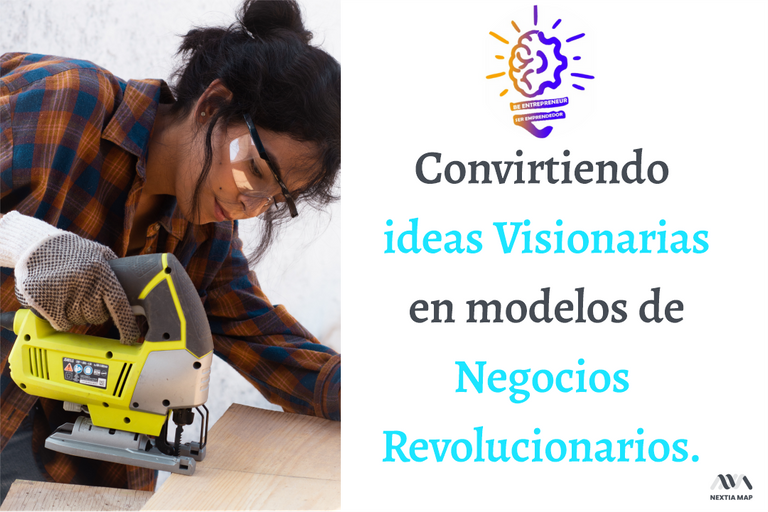

English version at the end of the Spanish version
Ya llevaba cuatro días de cinco, que tenía programados para conocer a emprendedores en la plataforma de Micromentor y determinar sí yo era la mentora adecuada para ellos. Quería un grupo de al menos diez emprendedores, pero hasta con cinco estaría perfecto.
La mayoría de los entrevistados no sabían ni de qué iba su negocio, cada vez que llegaba a la parte de la entrevista donde debían explicarme de qué iba su negocio, la mayoría contestaba diciendo lo que vendían y si tenían un local o vendían desde la calle o si tenían un puesto ambulante.
Para tratar de ayudarlos un poco y que yo pudiera entender un poco más sobre su negocio, les preguntaba qué cuál creían que era su mayor problema actualmente. Unos respondían que era la falta de capital o que no encontraban socios que los ayudaran a sacar el negocio adelante. Hubo algunos que ya tenían un tiempo con su negocio y decían que el problema era la falta de empleados leales, falta de clientes recurrentes o que la competencia les estaban ganando los clientes porque tenían precios más bajos.
Después de haber trabajado con más de cincuenta emprendedores, yo sabía que su problema real no era ninguno de los que habían mencionado, ni siquiera la falta de capital, el problema es que no sabían qué estaban haciendo, por qué lo hacían, ni mucho menos cómo debían hacerlo.
Si el propio emprendedor no puede describir su negocio, no puede esperar a que este vaya bien ni a que otras personas quieran invertir en él, mucho menos puede esperar que los clientes le sean fieles ni por ser la única opción para ellos.
Esto se debe a que sin la información básica de lo que es su negocio, el emprendedor no puede entablar una comunicación adecuada con otras personas. Por muy claro que pueda ser su mensaje para él, es como si le hablara en Mandarín o Árabe alguien que habla Español o Inglés.
Una mala comunicación no sólo puede provocar clientes insatisfechos, sino también que las personas que colaboren con nosotros no se sientan motivados a aportar sus habilidades y recursos a nuestro proyecto, y ni que decir de un posible inversor o de los socios.
La comunicación consta de cinco elementos clave, el emisor (el emprendedor), el Mensaje, y el Receptor que pueden ser nuestros clientes, colaboradores, inversores, socios o todos juntos. Los otros dos elementos son el código o lenguaje, y el canal por donde se transmite el mensaje, pero pasan a segundo término si el mensaje no es claro, no importa que el lenguaje sea el mismo ni que se use el mejor canal.
Así que si un negocio vive gracias a sus clientes, debemos conocer nuestro negocio para poder comunicarnos con ellos, tanto para convertirlos en clientes recurrentes como para atraer clientes nuevos.
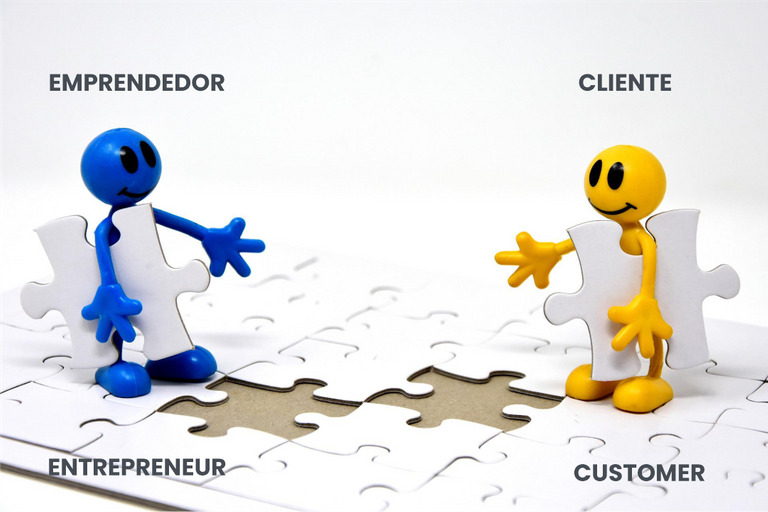
OBJETIVO EMPRENDEDOR
Uno de los motivos más comunes por los que se inicia un negocio es porque se busca una fuente de dinero, pero hay quienes lo hacen porque buscan la libertad que cuando trabajan para alguien más no pueden obtener.
También hay quienes lo hacen porque saben que este es parte del camino a volverse millonarios. Y no podemos olvidar quienes lo hacen porque saben que este es el camino para transformar el mundo o generar impacto positivo y de larga duración.
Sin importar qué es lo que a ti te haya movido a desarrollar un negocio o te esté moviendo a hacerlo, deja por escrito por qué lo haces y qué es lo que esperas de este negocio. Responde a la pregunta ¿Qué quiero lograr con este emprendimiento?
Si quieres saber un poco más del tema puedes leer este post donde encontrarás un camino para definir tu Objetivo Emprendedor.
PROPÓSITO
Este punto es donde defines por qué debe existir tu negocio, por qué lo que ofreces es importante para las otras personas, por qué las personas a qué está dirigido deberían comprarte a ti o contratarte a ti y no a otros negocios similares.
Aquí nos separamos del negocio, le damos una identidad propia, casi lo convertimos en nuestro hijo, que si bien es una extensión de nosotros, tiene su propia esencia y personalidad.
Ten claro que su Propósito es distinto al tuyo, por lo que también puede tener una vida más larga o más corta que tú. Si bien no es necesario establecer el lapso que va a durar, ya que eso es algo complejo de predecir, si puedes hacer el ejercicio de imaginarlo en con el paso del tiempo.
El Propósito de tu negocio no sólo te servirá de inspiración para alcanzar tus objetivos, sino también te facilitará que otras personas quieran ayudarte a alcanzarlos, ya sea como clientes, como socios o como colaboradores.
En el libro Empieza con el Por Qué de Simon Sinek tienes la información necesaria para desarrollar este punto de tu negocio, ahora que si quieres algo más práctico aquí tienes una guía práctica que te ayudará a definir este tema.
PROYECTO
Más del 80% de los emprendedores que inician un negocio, pasan de la idea a tratar de conseguir clientes y/o inversores, o peor que eso, se lanzan a invertir todos sus recursos en la construcción de un negocio que ni siquiera tienen claridad de qué se trata su proyecto.
Sé que mucho de esto se debe a que gran parte de los emprendedores inician su negocio por la necesidad muchas veces urgente, de obtener ingresos, pero si tan sólo se detuvieran a describir en pocas palabras su negocio, a definir cual será el Sistema de este, o sea qué productos van a comercializar, en qué lugares, y cuáles serán las formas en que sus clientes podrán pagar los productos; esto les daría claridad en lo que van a hacer.
Si además se toman el tiempo de describir los procedimientos de cómo funcionará su negocio, de identificar las funciones que le dan forma, quienes serán los colaboradores que desarrollarán esas funciones y enlistar los recursos; tendrían una idea de cómo invertir su dinero, tiempo y energía.
Que decir si se dieran el tiempo de elaborar al menos una estrategia general y de poner reglas y/o lineamientos, definitivamente aumentarían sus probabilidades de alcanzar los objetivos para los que están desarrollando su negocio.
El Proyecto consta entonces de:
- La Descripción breve y concisa de su idea de negocio.
- Sistema de Negocio.
- Procedimientos generales
- Funciones generales
- Colaboradores actuales y futuros
- Recursos
- Estrategia General
- Reglas y/o Lineamientos
MODELO DE NEGOCIO
Una vez que tienes claro en qué consiste tu proyecto de negocio, es momento de describir cómo va a funcionar, a esto se le conoce como Modelo de Negocio, es muy diferentes a un Plan de Negocio ya que el plan tiene que ver con lo que esperas lograr.
El concepto de modelo de negocio lo popularizaron Alexander Osterwalder uno de los más prestigiosos teóricos en negocios, y el reconocido científico en computación Yves Pigneur, en su libro Generación de modelos de negocio, donde comparten una herramienta que llamaron Canvas de Modelo de Negocio.
El Lienzo que proporcionan en su libro consta de nueve elemento, Cliente, Propuesta de Valor, Fuente de Ingresos, Canales, Relaciones con los Clientes, Alianzas Clave, Actividades Clave, Recursos Clave y Estructura de Costes.
Personalmente yo le agregué dos que han ayudado a más desarrollar mas de 200 modelos de negocios innovadores y a tener más claridad sobre como esos negocios se diferencian de la competencia. Estos elementos son Innovación, y Contexto que está compuesto por conocimiento en la Competencia, los Stackeholders y la Identificación del Diferenciador , estos los puedes ver en el Lienzo Nextia Map.
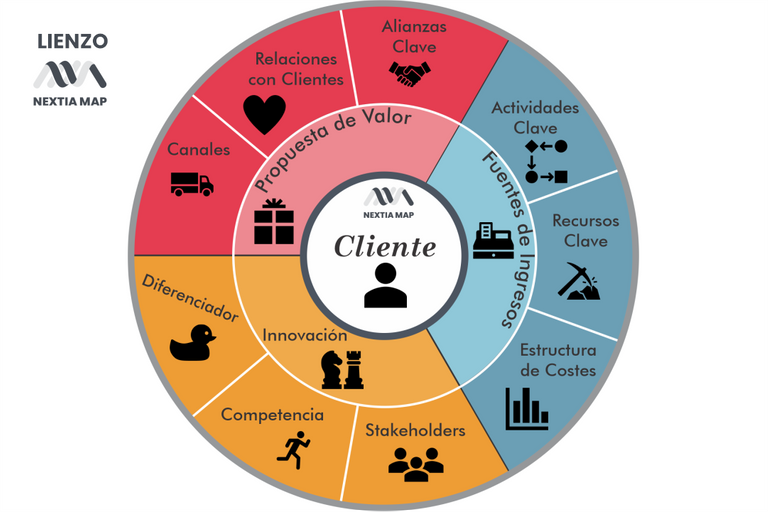
Desarrollar todos estos puntos por primera vez puede llevarte hasta cuatro semanas si le dedicas al menos tres horas diarias y si tienes que investigar cómo desarrollar cada uno de los puntos, si quieres hacerlo en menos tiempo puedes adquirir el libro Generación de Modelos de Negocios o en Nextia Map encuentras las guías que te facilitan ese proceso y que podrás hacerlo en menos de la mitad del tiempo, a un precio mucho más accesible.
Si aún con esas herramientas crees que en estos momentos no puedes dedicarle tanto tiempo o que no tienes el dinero suficiente para adquirir las herramientas, desarrolla al menos la parte más elemental de tu negocio, que es el Modelo de Ingresos, el cual consiste en desarrollar los primero puntos del Lienzo. Cliente, Propuesta de Valor, Fuente de Ingresos e Innovación.
En el siguiente post te explicaré cómo desarrollar el Modelo de Ingresos, así que no dudes en seguirme para que no te pierdas esa información.
Los emprendedores que desarrollan sus negocios con ayuda de asesores y/o dentro de incubadoras de negocios aumentan sus probabilidades de éxito debido que ahí les enseñan y llevan paso a paso a desarrollar esos cuatro puntos, de hecho para ingresar a alguna de esas incubadoras es indispensable que los presenten.
La forma más adecuada de emprender es que antes de iniciar cualquier proyecto se conozcan todos esos puntos del negocio, sin embargo para la mayoría de los emprendedores la falta de dinero hace que se dediquen más a lo urgente que a lo importante, y se lancen a ofrecer sus productos al mercado.
Si ya estás emprendiendo o si crees que no puedes esperar el tiempo que te llevaría desarrollar esos puntos antes de "lanzarte" al mercado porque ya tienes la urgencia de generar ingresos, no hay problema siempre y cuando vayas trabajando a la par en describir esos puntos.
Tan sólo tener el modelo de ingresos te ayudará a entender quién es tu cliente realmente, qué es por lo que está dispuesto a pagarte, cuál es tu verdadera fuente de ingresos, y cómo es que puedes ir creciendo.
Emprender sin tener la información básica, es como esperar ganar la lotería del mes actual con boleto del año pasado. Si no te das el tiempo de trabajar esos puntos, no importa que idea de negocio encuentres, no lograrás desarrollar una fuente de ingresos estable y sostenible. Te pasarás la vida de un negocio a otro, llenándote de frustración, y de pensamientos negativos que pueden llegar a tener una vida muy complicada.
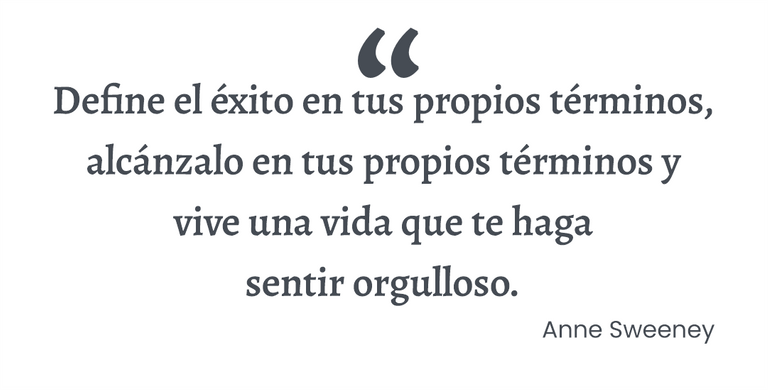
Entender cuáles son tus objetivos emprendedores te ayudará a definir el tipo de negocio más adecuado para ti. Lo que te permitirá saber cuál es el propósito de ese negocio.
Describir el proyecto de negocio, te ayudará a saber con qué recursos y con qué información cuentas en estos momentos y cuál necesitas recabar para poder entender qué es lo que se necesita hacer y hasta donde quieres llegar.
El modelo de negocios te ayudará a distinguir qué partes de tu negocio no están funcionando, donde debes invertir tus recursos, qué elementos son los que requieren cambiar o transformase para poder crecer o generar más ingresos, y sin duda, el modelo de negocio es el que te permitirá implementar un sistema de innovación que te permita tener una fuente de ingresos por mucho tiempo.
Antes se creía que si querías aprender a hacer negocios debías estudiar administración de empresas o contabilidad, con el tiempo y gracias a la tecnología, nos dimos cuenta que en esas carreras o profesiones se nos preparaba para ser empleados o para manejar empresas, no importaba el tamaño, pero ya debía ser un negocio que estuviera funcionando y que se buscara hacer crecer.
Las instituciones y gobiernos que han implementado planes para enseñar a las personas a hacer negocios desde cero, son las que han desarrollado grandes empresas y sociedades con mejor calidad de vida, ya que los emprendedores que alcanzan el éxito, no sólo desarrollan negocios sostenibles, sino que dan empleos directos e indirectos a otras personas.
No importa en qué etapa de tu emprendimiento te encuentres, en el momento en que empieces a tener claridad sobre tu negocio empezarás a ver un cambio, tanto en ti como emprendedor, como en la forma en que vas llevando tu negocio.
Esos cambios sin duda mejorarán tu vida y te permitirán disfrutar más esta parte de tu vida, la vida emprendedora.
Conoce las herramientas Nextia Map si quieres desarrollar un modelo de negocio innovador y de manera sencilla y práctica.
Gracias por leer este post, si algo de ello te pareció interesante o hay algún tema del que te gustaría tener más información deja tus preguntas en los comentarios y con gusto las iré respondiendo.
NOTAS:
- Este post puede contener links de afiliados, ya que el Marketing de Afiliados es una mis fuentes de ingresos.
- IMÁGENES ORIGINALES DE: IMAGEN 01 IMAGEN 02

Translated with www.DeepL.com/Translator (free version)

The sixteenth entrepreneur I interviewed and I felt that I was not going to gather the number of entrepreneurs needed for the new consulting season.
I had already spent four days out of the five I had scheduled to meet entrepreneurs on the Micromentor platform and determine if I was the right mentor for them. I wanted a group of at least ten entrepreneurs, but even five would be perfect.
Most of the interviewees did not even know what their business was about, every time I got to the part of the interview where they had to explain to me what their business was about, most of them answered by saying what they sold and if they had a store or if they sold from the street or if they had a street stall.
To try to help them a little and so that I could understand a little more about their business, I asked them what they thought was their biggest problem at the moment. Some answered that it was the lack of capital or that they could not find partners to help them get the business off the ground. Some had been in business for a while and said that the problem was a lack of loyal employees, a lack of repeat customers, or that the competition was winning their customers because they had lower prices.
Having worked with more than fifty entrepreneurs, I knew that their real problem was none of the above, not even lack of capital, the problem was that they did not know what they were doing, why they were doing it, let alone how they should do it.
If the entrepreneur himself cannot describe his business, he cannot expect it to do well or for other people to want to invest in it, much less can he expect customers to be loyal to him or for him to be the only option for them.
This is because without the basic information about what your business is about, the entrepreneur cannot communicate properly with others. As clear as your message may be to him, it is as if you were speaking Mandarin or Arabic to someone who speaks Spanish or English.
Poor communication can not only lead to dissatisfied customers, but also to people who collaborate with us not feeling motivated to contribute their skills and resources to our project, not to mention a potential investor or partners.
Communication consists of five key elements, the sender (the entrepreneur), the Message, and the Receiver, which can be our clients, collaborators, investors, partners or all of them together. The other two elements are the code or language, and the channel through which the message is transmitted, but they take second place if the message is not clear, no matter if the language is the same or if the best channel is used.
So if a business lives thanks to its customers, we must know our business to be able to communicate with them, both to convert them into recurring customers and to attract new ones.

To have a clear message and start having an assertive communication, the four basic things you should know about your business are: What is your business Project, what is your Business Model or at least your Revenue Model, what is the Purpose of your business, and mainly what motivates you to undertake and what do you hope to achieve in your life with that venture.
ENTREPRENEURIAL GOAL
One of the most common reasons for starting a business is because you are looking for a source of money, but there are those who do it because they are looking for the freedom that when they work for someone else they cannot get.
There are also those who do it because they know that this is part of the road to becoming millionaires. And we can't forget those who do it because they know this is the path to transforming the world or making a positive, long-lasting impact.
No matter what it is that has moved you to develop a business or is moving you to do it, write down why you are doing it and what you expect from this business. Answer the question What do I want to achieve with this venture?
If you want to know a little more about this topic you can read this post where you will find a way to define your Entrepreneurial Goal.
PURPOSE
This point is where you define why your business should exist, why what you offer is important for other people, why the people to whom it is directed should buy from you or hire you and not other similar businesses.
Here we separate ourselves from the business, we give it an identity of its own, we almost turn it into our child, that although it is an extension of us, it has its own essence and personality.
Be clear that its Purpose is different from yours, so it may also have a longer or shorter life than you. While it is not necessary to establish how long it will last, since that is something complex to predict, you can do the exercise of imagining it over time.
The Purpose of your business will not only inspire you to reach your goals, but it will also make it easier for other people to help you reach them, whether as customers, partners or collaborators.
In the book Start with Why by Simon Sinek you have the necessary information to develop this point of your business, now if you want something more practical here you have a practical guide that will help you define this topic.
PROJECT.
More than 80% of entrepreneurs who start a business, go from the idea to trying to get customers and/or investors, or worse than that, they start investing all their resources in building a business that they are not even clear about what their project is about.
I know that much of this is due to the fact that most entrepreneurs start their business because of the often urgent need to obtain income, but if they would just stop to describe their business in a few words, to define what the system of this will be, that is, what products they will market, in what places, and what will be the ways in which their customers can pay for the products; this would give them clarity in what they are going to do.
If they also take the time to describe the procedures of how their business will work, to identify the functions that shape it, who will be the collaborators that will develop those functions and list the resources; they would have an idea of how to invest their money, time and energy.
What if they took the time to develop at least a general strategy and set rules and/or guidelines, they would definitely increase their chances of achieving the objectives for which they are developing their business.
The Project consists then of:
- The brief and concise Description of your business idea.
- Business System.
- General Procedures
- General functions
- Current and future collaborators
- Resources
- General Strategy
- Rules and/or Guidelines
BUSINESS MODEL.
Once you are clear about what your business project consists of, it is time to describe how it is going to work, this is known as a Business Model, it is very different from a Business Plan since the plan has to do with what you expect to achieve.
The concept of business model was popularized by Alexander Osterwalder, one of the most prestigious business theorists and the renowned computer scientist Yves Pigneur, in his book Business Model Generation, where they share a tool called Business Model Canvas.
The Canvas they provide in their book consists of nine elements, Customer, Value Proposition, Revenue Source, Channels, Customer Relationships, Key Alliances, Key Activities, Key Resources and Cost Structure.
I personally added two that have helped more than 200 innovative business models to develop and to have more clarity on how those businesses differentiate themselves from the competition. These elements are Innovation, and Context which is composed of knowledge on Competition, Stakeholders and Differentiator Identification, these you can see in the Nextia Map Canvas.
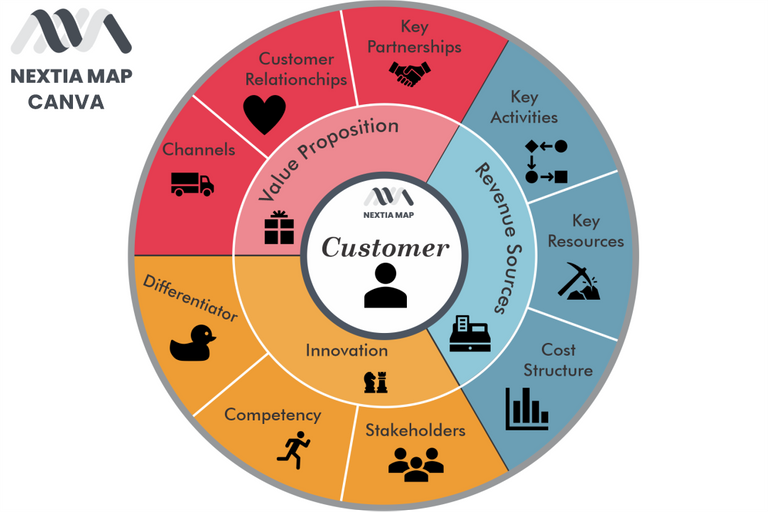
Developing all these points for the first time can take you up to four weeks if you dedicate at least three hours a day and if you have to research how to develop each of the points, if you want to do it in less time you can purchase the book Business Model Generation or in Nextia Map you can find the guides that facilitate this process and you can do it in less than half the time, at a much more affordable price.
If even with these tools you think that at this moment you cannot dedicate so much time or that you do not have enough money to acquire the tools, develop at least the most elementary part of your business, which is the Revenue Model, which consists of developing the first points of the Canvas. Customer, Value Proposition, Revenue Source and Innovation.
In the next post I will explain how to develop the Revenue Model, so don't hesitate to follow me so you don't miss that information.
Entrepreneurs who develop their businesses with the help of advisors and/or within business incubators increase their chances of success because there they are taught and taken step by step to develop these four points, in fact to enter any of these incubators it is essential to present them.
The most appropriate way to start a business is to know all these points before starting any project, however for most entrepreneurs the lack of money makes them focus more on what is urgent than what is important, and they start offering their products to the market.
If you are already in business or if you think you can't wait the time it would take you to develop these points before "launching" into the market because you already have the urgency to generate income, no problem as long as you are working on describing these points.
Just having the revenue model will help you understand who your customer really is, what they are willing to pay you for, what your real source of income is, and how you can grow.
Starting a business without having the basic information is like hoping to win the current month's lottery with last year's ticket. If you don't take the time to work on these points, no matter what business idea you come up with, you will not be able to develop a stable and sustainable source of income. You will spend your life going from one business to another, filling yourself with frustration and negative thoughts that can make your life very complicated.
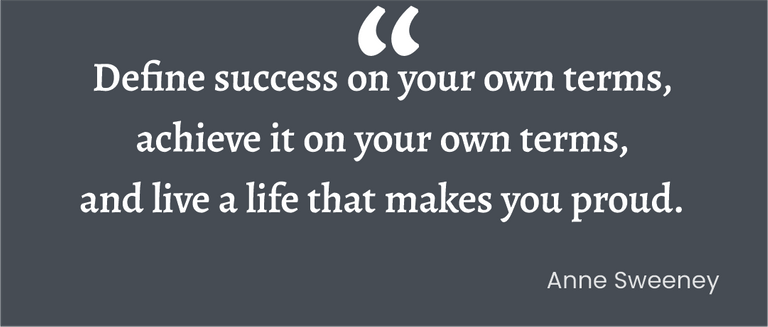
Understanding what your entrepreneurial goals are will help you define the type of business that is right for you. This will allow you to know what the purpose of that business is.
Describing the business project will help you know what resources and information you currently have and what information you need to gather to understand what needs to be done and how far you want to go.
The business model will help you to distinguish which parts of your business are not working, where you should invest your resources, which elements need to be changed or transformed in order to grow or generate more income, and without a doubt, the business model is the one that will allow you to implement an innovation system that will allow you to have a source of income for a long time.
In the past it was believed that if you wanted to learn to do business you had to study business administration or accounting, with time and thanks to technology, we realized that in those careers or professions we were prepared to be employees or to manage companies, no matter the size, but it had to be a business that was working and that was looking to grow.
The institutions and governments that have implemented plans to teach people to do business from scratch, are the ones that have developed great companies and societies with better quality of life, since entrepreneurs who achieve success, not only develop sustainable businesses, but also provide direct and indirect jobs to other people.
No matter what stage of your entrepreneurship you are in, the moment you begin to have clarity about your business you will begin to see a change, both in you as an entrepreneur and in the way you are running your business.
Those changes will undoubtedly improve your life and allow you to enjoy more this part of your life, the entrepreneurial life.
Get to know Nextia Map tools if you want to develop an innovative business model in a simple and practical way.
Thanks for reading this post, if you found any of it interesting or if there is any topic you would like to know more about, leave your questions in the comments and I will be glad to answer them.
SPECIAL THANKS @beentrepreneur
NOTES:
Doing your bit by recycling♻🙏👍
Hola @mireyalara definir y darle forma a nuestro emprendimiento requiere de esos cuatro pasos fundamentales que señalas. Cada uno en sí mismo tiene una razón de ser que no es otra que determinar lo que queremos y hacia donde vamos, formando con ello un bloque que nos permite mirar "desde fuera" y con mayor claridad las estrategias que requerimos para "garantizar", en la medida de lo posible, su crecimiento.
Gracias por aportar tus conocimientos y experiencias que orientan al emprendedor hacia acciones más efectivas.
Si no sabemos qué queremos es difícil seguir adelante. Son muchas las cosas a tener en cuenta para que el emprendimiento llegue a buen puerto. Acá nos dejas una buena cantidad de información.
Para efectos didácticos sería interesante conocer algunos casos de los que se han presentado en Micromentor y las enseñanzas que han dejado. Gracias por compartir. Que estés bien estimada @mireyalara. Un fuerte abrazo desde Maracay.
Hola @irvinc gracias por leer el post.
Sí, precisamente sobre eso será el siguiente post, sobre cómo esta información cambió el rumbo de la vida de dos emprendedores.
Gracias por la idea, y si hay algún otro tema del que te gustaría que hablara, avísame para ir preparando el post.
Excelente inicio de semana.
Muchas gracias, lo tendré en cuenta. Feliz semana.
Congratulations @mireyalara! You have completed the following achievement on the Hive blockchain and have been rewarded with new badge(s):
Your next target is to reach 600 comments.
You can view your badges on your board and compare yourself to others in the Ranking
If you no longer want to receive notifications, reply to this comment with the word
STOPCheck out the last post from @hivebuzz: